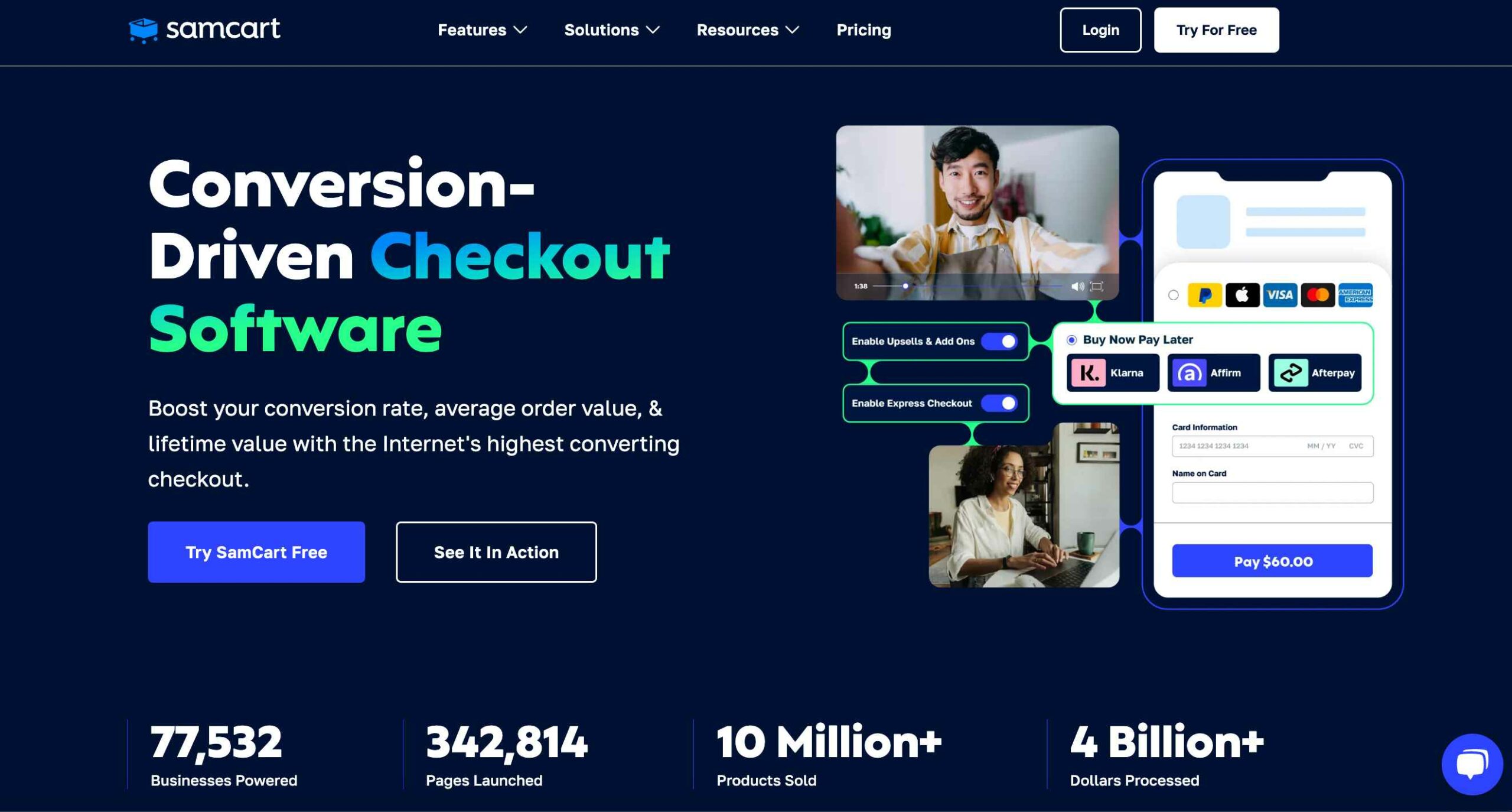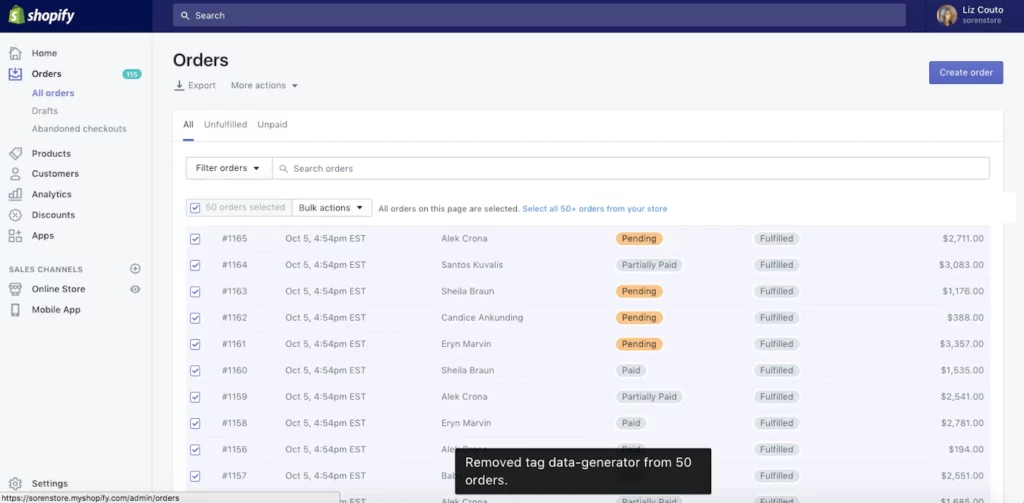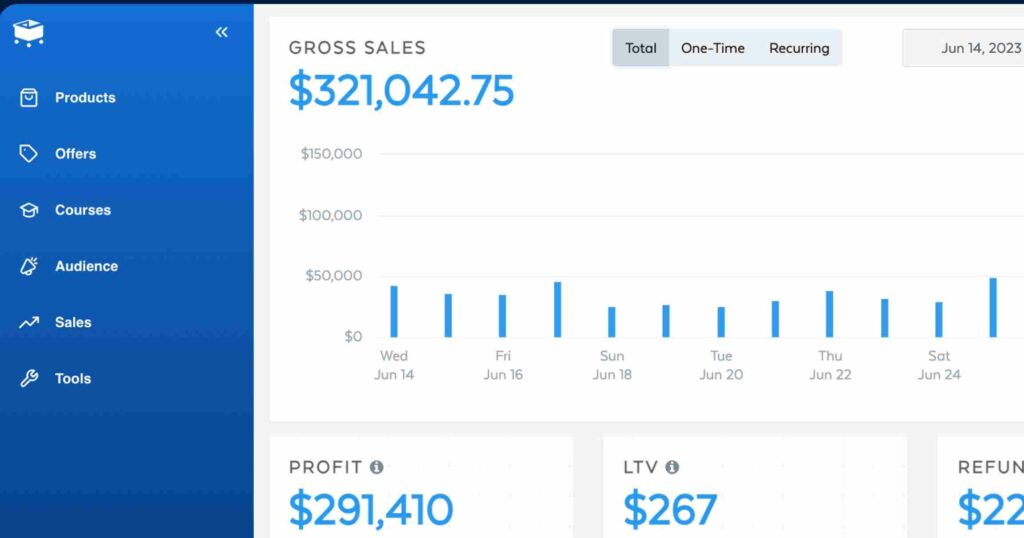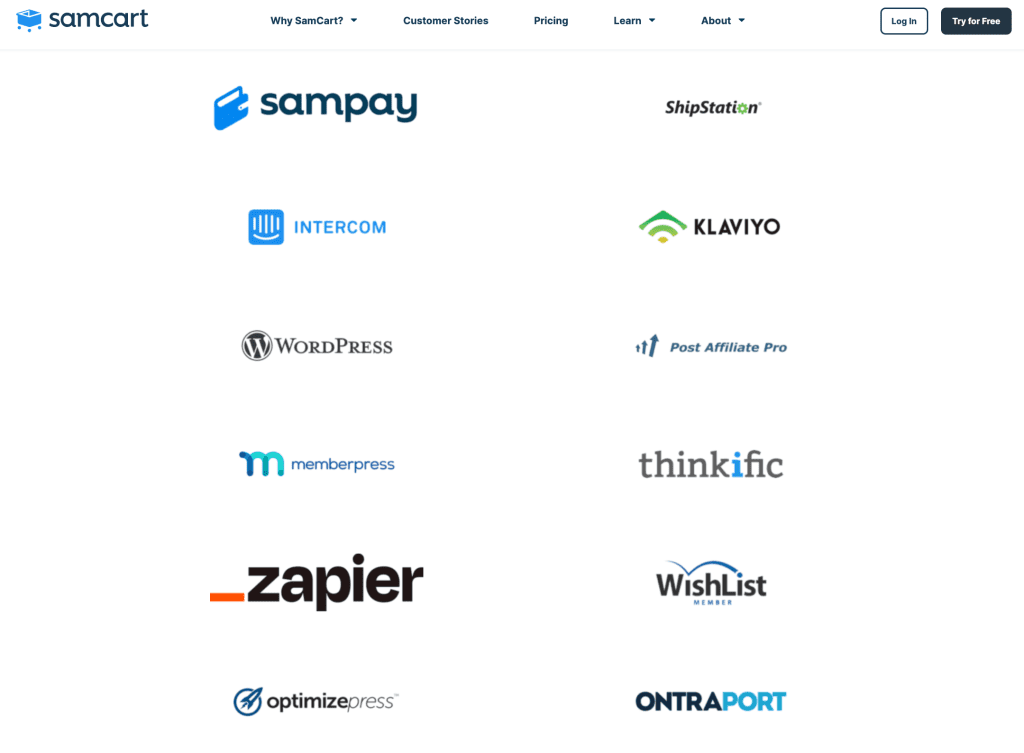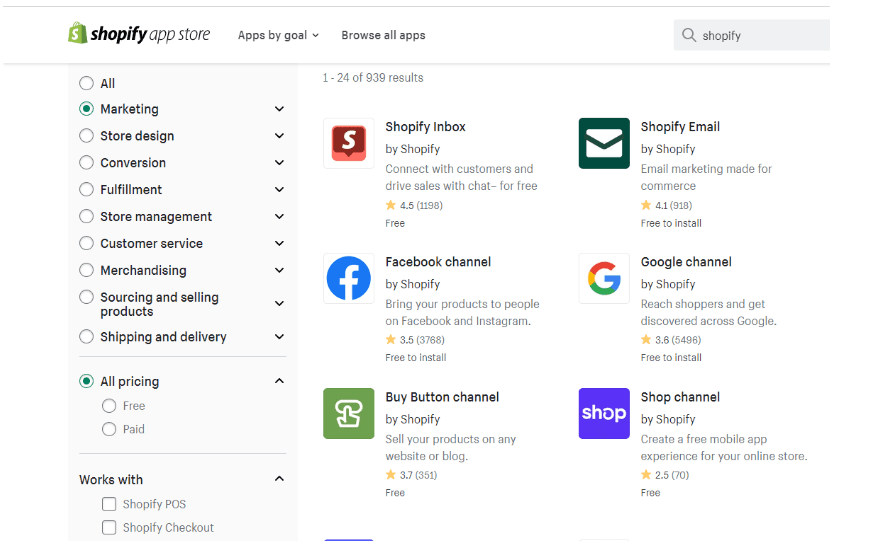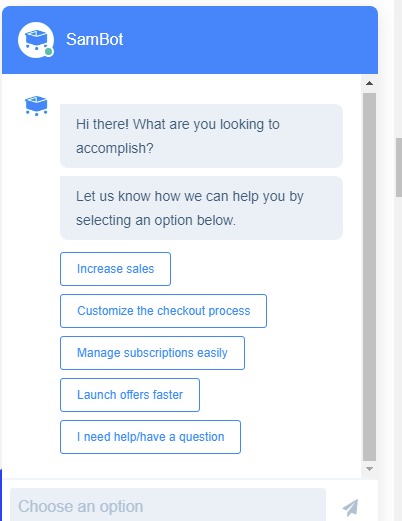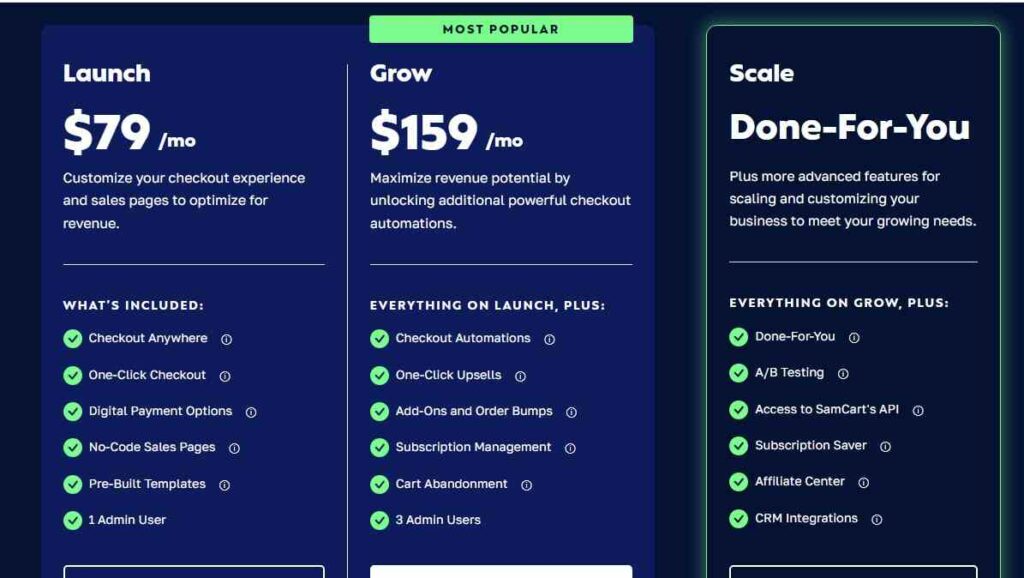Are you looking for a SamCart vs Shopify comparison? Read this post till the end, or jump to the bottom line below.
Samcart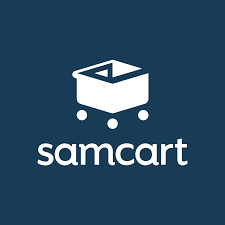 Check out
Check out
|
Shopify Check out
Check out
|
|---|---|
| $79/month | $29/month |
Influencers, Entrepreneurs, Course Creators, Authors, Non-Profits, Amazon Sellers and Product Inventors |
Those wishing to create an online store, want to sell product and sell Dropshipping store. |
|
|
|
|
|
|
|
A user-Friendly interface and templates, as well as tutorials, are easy to start off with. |
Shopify is considered to be an easy yet complicated platform, and that depends on how the user uses it. |
|
Monthly pricing plans are worth it and come with all the bells and whistles. |
Shopify has a free plan and three other plans for setting up the business, which are slightly higher. |
|
Stellar Customer Support provides live tutorials, demos, and documentation. |
Apart from live chat, Shopify has everything that a great tool needs in terms of stellar support. |
| Check out | Check out |
Choosing between SamCart and Shopify felt a bit like deciding on my next big move—both promising, but in different ways. I’ve been dreaming about launching my online store.
I wanted something user-friendly and not too technical because I’m no tech wizard. I needed a platform that could smoothly handle everything from showcasing my products to processing payments.
SamCart caught my eye because it seemed super easy to set up a cart and make sales quickly. Shopify, on the other hand, appeared like a one-stop shop for creating a full-fledged online store, offering tons of designs and features.
It was a tough call, as both platforms promised to make my e-commerce dream a breeze.
So, I decided to dive into what each platform offers, focusing on their strengths and how they match up with what I was looking for—ease of use, efficiency, and the potential to scale with my business.
Here, you will find brief and basic information about SamCart vs Shopify that will help you decide on the best option for your business.
Contents
SamCart vs Shopify 2024: Overview
Before comparing the features of both platforms, let’s talk about SamCart and Shopify first.
SamCart Info
Samcart started in 2012 and is one of the best online shopping carts. Users can quickly create useful checkout pages and sell physical or digital goods.
SamCart provides a variety of options regarding payment methods, such as payment plans, trials, subscriptions, shipping options, single payments, various currencies, etc.
SamCart brought up 18 various checkout templates that were tested for conversion, and one of the popular templates that SamCart consists of is the one-page funnel.
You can add important pieces to this path, like extra offers or discounts. SamCart helps you create pages for selling, memberships, webinars, and more. You can also test if your selling path is working well by comparing two versions with an A/B test.
Shopify Info
Founded in 2006, Shopify is a major player in eCommerce. It’s ideal for selling many physical products, providing a platform for users to add items to their cart and complete their purchases.
Shopify has impressive features, but unlike SamCart, it lacks built-in upsells and split testing capabilities. This means users may need to integrate third-party tools to create special offers and test their sales strategy.
However, the advantage is that Shopify enables users to manage the entire selling process on a single platform without relying on external websites for transactions.
Shopify comes with a drag-and-drop feature that offers consistent and flawless editing. It also gives developers access. If you are a pro coder, you can check out the code of the templates and edit the layouts with a few twitches in HTML.
The Shopify app store provides many combinations of E-commerce services, which include a major part of digital business processes like payment processing, order management, marketing processes, accounting, customer support, product research, etc.
Features Comparison: SamCart vs Shopify
1). Templates and Web Design
Shopify
Shopify provides a few pre-designed templates that are amazing and skillful, but it doesn’t provide templates that work on checkout pages.
However, it offers some online store subjects and themes that consist of a set of web pages. It provides more than 70 themes, out of which 10 are complimentary.
Others are available for $140-$180, as they are surcharge themes. Shopify also has a good team of planners and developers who can plan and design a brand-new subject according to the site if you can afford it.
The editing feature in Shopify provides better options than SamCart, and if you are a pro in web development, you can tweak the codes of Shopify’s templates.
SamCart
SamCart offers about 18 skilfully planned and designed templates. They are quite interested in their funnel builder and help you fix up your sales funnel in less than expected time.
You are free to choose any template without any extra charges. Multiple businesses tested all of these templates to evaluate the results.
So, the templates provided by SamCart not only improve the conversions but are operative and productive as well.
If you want to bring out any modifications or changes in any of the layouts or templates, Samcart offers an easy customization process.
The colors of the layouts are adjustable. Once you choose the template, you can amend the text, and different elements can be twitched. Templates can be easily handled on mobile devices and are responsive to both mobile devices and PCs as well.
Both Shopify and SamCart provide various templates for various businesses. However, the notable dissimilarity between these two tools is that Shopify fixes on the wholly advanced online store themes, whereas SamCart concentrates on checkout pages.
SamCart’s templates are free, whereas we must pay for most of Shopify’s premium themes.
2). E-commerce Features
Shopify
Shopify is one of the most well-founded, organized, and well-developed e-commerce platforms; as a user, you might anticipate that it provides all the key features and important services of online selling.
And Shopify does this without any remark. The way Shopify administrates a product is quite inclusive. Multiple products and classifications can be added without any limitations.
It gives you the option to choose the kind of product (digital or physical) you want to sell.
In the case of a subscription-based business, you will be able to incur some extra charges. Shopify does not have this service as an in-built feature.
However, you can achieve this by hiring a developer or by combining an application that is suitable, consistent, and compatible with your packages.
Shopify offers tremendous tools that are accessible to help you uplift your deals and sales. For instance, you can fix some mechanized discount options for your consumers and even bring up constancy schemes.
Even if you optimize the payment processes, you still need to explore the alternatives provided in their App Store. If you choose alternative payment methods other than Shopify, then you will be charged additional transaction fees.
But with the help of optional gateways, you will be able to receive remittances from many consumers.
SamCart
Samcart is an easy application for marketing funnels. It has an array of astounding e-commerce attributes. It can board and take in digital as well as physical goods.
This particular thing helps in evaluating the conversion rate of the checkout pages. Another notable characteristic of Samcart is its associative system. Here, you can support fellow marketers through the planned associate programs.
Some of the helpful traits, namely one-click up-sell, can uplift your possible income during checkout. This encourages consumers to purchase more goods by just clicking once to add them to a cart.
In SamCart, shipping charges are automatically added to the order simultaneously when the consumer places it. You can customize these shipping charges depending on your geographical location. However, you are free to set a common rate for all the orders.
Even though Shopify is a famous e-commerce site, it is not specifically for online selling alone. However, it does provide services for various stores through the Shopify POS system.
Now, we can acknowledge that SamCart contains the accurate tools to allow quick and simple selling schemes through checkout pages.
Other kinds of products can be initiated, and associate schemes can be utilized, except for A/B conversion trials. However, these are not equivalent to the features provided by Shopify.
Shopify does not restrict any tools related to checkout pages and further gives you access to integrate with other third parties.
Considering all these facts, Shopify is considered to be better than Samcart in terms of e-commerce features.
3). Ease of Use
Shopify
Shopify is good for selling things online and creating a whole site. You can customize a lot to match your brand. However, the customization tab is a bit hard to find. You have to search and switch between tabs to discover it.
It gives you lots of choices for your online store and has cool stuff for sellers. Even if you’re not a techie, you can start fresh with it.
Once you sign up, Shopify will guide you through everything. They help you set up your store, like choosing a look and adding products. You can choose a free or paid look and change it to fit your business.
SamCart
SamCart has an interface that is easy to use and simple to understand. All the features are arranged in such an order that newbies can easily explore them.
If you need some extra guidance, SamCart provides many guides and tutorials, along with good customer service.
You can design a checkout page quickly and integrate it with PayPal or Stripe. In addition to serving novices and new starters, SamCart also serves advanced businesses by offering new premium features.
SamCart helps you set up and start an associate program easily. The payment structure is flexible —you are free to customize and fix the rate for each product.
You also have the option to create a “VIP confederate” in case you want to set a different level for a few frequent users.
Verdict:
The entire procedure of designing, operating, and controlling the marketing funnels on Shopify is as simple as in SamCart. Though Shopify provides many built-in features and is a more consumer-friendly system than SamCart, it relatively backs off concerning ease of use.
4) Apps & Integrations
SamCart
SamCart integrates with over 120 apps and plugins. Users can easily install available apps with just one click, and there’s no need to learn how to use each app separately.
If you don’t see your preferred app, SamCart provides a custom API feature to integrate it into your store.
For those interested in the SamCart Sales Integration, please note that access to the custom API feature requires the purchase of the Scale plan. However, some users might find the Scale plan expensive.
An alternative solution is to use Integrated, an automation app that allows SamCart users to install more than 1,000 apps.
Shopify:
Shopify stands out among eCommerce platforms. It offers a whopping 6,000 apps for different purposes. 2,700 of them are free, and the remaining 3,300 are paid, with prices ranging from $10 to $299 per month.
If you are exploring apps for Shopify, you can find them in the Shopify App Store. The store features a search box with a filter option, making it easy for you to find apps based on category and price.
Most paid apps also provide a limited free trial, allowing you to test them before making a purchase.
5) Customer Support
SamCart
SamCart is dedicated to customer satisfaction through SamBot, a conversational bot that facilitates efficient communication. The platform excels at addressing customer needs, boosting increased engagement, and simplifying users’ business processes.
With an integrated network of promotional partners, SamCart supports product sales.
The communication and support team is consistently available to resolve customer queries.
Shopify
Shopify offers around-the-clock customer assistance through live chat. The website includes a comprehensive help section covering topics such as starting, selling, managing, marketing, and growing a business.
It also fosters community engagement through discussion boards where members share insights on marketing tactics and shop performance, including store design ratings.
SamCart vs Shopify: Which has better pricing?
When deciding between SamCart and Shopify for your business, pricing is a crucial factor to consider.
It’s essential to select a platform where you only pay for the features you need. Look for a flexible pricing structure that allows you to customize your plan according to your business requirements.
Shopify Pricing Plans
Shopify offers monthly, 1-year, 2-year, and 3-year plans with three pricing plans. Opting for a yearly plan provides significant discounts when paid in advance. Additionally, all plans come with a 3-day free trial, so you can experience the features before committing.
For beginners, there’s an exclusive offer of $1 per month for the Basic plan, available for the first three months. It’s a great opportunity to get started with our services at a very affordable rate.
1). Basic Shopify: $29 per month
- They charge 2% extra fees for every feature other than the inbuilt and default features.
- Access to third-party and other Shopify POS applications
- 2.7%+0¢ transaction fee for individual credit card
- SSL certificates are free of charge
- Recovery of abandoned Cart
- Two staff accounts
2). Shopify: $79 per month
- 1% extra fee on each feature other than default Shopify remittance.
- 2.5%+0¢ transaction fee for individual credit card
- They give a gift card.
- Professional reports on Business Analytics
3). Advanced Shopify Features: $299 per month
- 0.5% extra fee on each feature other than inbuilt Shopify remittance.
- 2.4%+0¢ transaction fee for individual credit card
- Advanced reports and Analytics
- 15 staff accounts
SamCart Pricing
SamCart offers a 7-day free trial. It has three pricing plans, divided into monthly and annual plans.
1) Launch plan $79/month
- One administrator only
- Beautifully designed templates
- Discounts and coupons
- Free trial
- Affiliate management
2) Grow plan: $159/month
- Three administrator
- 1-day email support
- Consumer support (online chats)
- Multiple payments options
- Zapier integration
- No transaction fee
- No setup fee
- A/B testing
3) Scale plan
- Ten administrator users
- Full email support
- Consumer support through every medium
- CRM integrations
Final Verdict: SamCart vs Shopify 2024
After reading and comparing every aspect now, I would say Shopify is the ultimate winner of this debate.
SamCart and Shopify are powerful platforms that offer legit and reliable services to their users, but you can’t compare them. Shopify completely leans toward commerce by offering web hosting, CMS, website building, design, and eCommerce tools.
On the other hand, SamCart is a smart application with all the necessary features to build and manage sales funnels. This simple application is one of the first choices of affiliate marketers and creators who want to convert a shopper into a customer.
However, both platforms are PCI-compliant and follow certain security measures and protocols so that you can ensure the security of customers’ cards and personal information.
So, choosing one of them will clearly depend on your needs. If you want to create a fully-fledged online store, go with Shopify.
Or, if you want to create a single-page checkout or sales funnel, go with SamCart.
Also Read:

